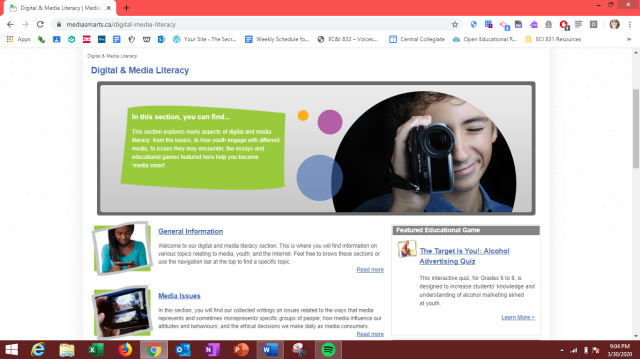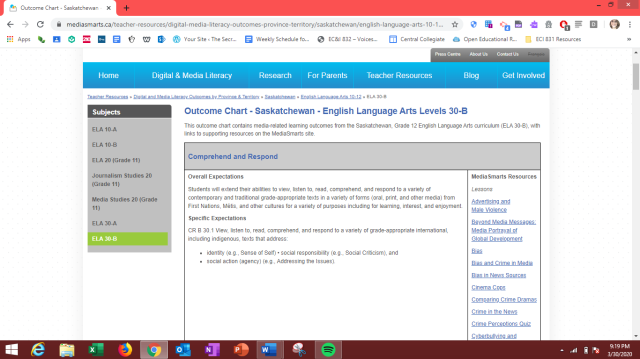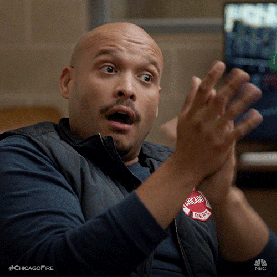I had planned on completing these reviews earlier in March, but as our teaching worlds were turned upside down recently, they are a little later than I would have liked, but no less, here’s another one! Hopefully it will be of good use to my colleagues and classmates as they embark on their newest remote, online teaching journeys.
Media Smarts is the second resource I would like to review for my major project. It is another website dedicated to educating children about digital literacy and media literacy, and it’s Canadian! They have many different types of resources for teachers, for parents, and for kids. They have an entire section dedicated to Digital & Media Literacy with many different Media Issues like body image, intellectual property, and violence listed. The website also listed a variety of Digital Issues ranging from authenticating information to cyber security, and online ethics. It also includes general information about digital and media literacy as well as information about video games, movies, and music.

There is a “For Parents” tab that offers many resources for parents to begin talking to their children about media and digital literacy. There are resource links to blogs, games, tips, guides, videos, and workshops. This is a great option for parents because I think it is very user friendly and easy to access, especially if you are not 100% comfortable with the topic. All the links provide detailed explanations and videos on how to discuss certain topics or how to become familiar with different ideas online. It definitely breaks things down, however I found some of the videos I browsed to be very simple, which can be good if you are brand new to the internet or teaching young kids, but any child older than ten would likely find the videos too simple and childish.
But the part of the website I really want to dig into is the Teacher Resources. I found this page to be incredibly resourceful and informative when it comes to the different sources and information listed. There is a Digital Literacy Framework for Canadian Schools which is actually broken down into K-3, 4-6, 7-8, and 9-12. These then connect to specific lessons and outcomes for students to hit and connects it to a specific framework piece, like ethics and empathy, privacy and security, community engagement, digital health, consumer awareness, finding and verifying, and making and remixing (very similar to Ribble’s Nine Elements of Digital Citizenship if I do say so myself)! And there are a ton of lessons to choose from to connect to the framework and age of students. As I scanned some of the example lesson plans, they all seemed age appropriate and suitable for the students they suggested. There is also a page connecting outcomes by province and territory to digital and media literacy which I haven’t seen before. It goes so far as to break it down by province, and then by subject area and then to specific curriculums. I was shocked when I decided to look further and found when I clicked on the English B30 tab (since that is the focus of my project) that it listed every outcome digital and media literacy could connect in. Beyond that, it even gives lesson plans and suggestions for each outcome! You will definitely need to check this out if you are looking for lesson plans on media and digital literacy in the future! It’s an unreal library!!
There is also a page connecting outcomes by province and territory to digital and media literacy which I haven’t seen before. It goes so far as to break it down by province, and then by subject area and then to specific curriculums. I was shocked when I decided to look further and found when I clicked on the English B30 tab (since that is the focus of my project) that it listed every outcome digital and media literacy could connect in. Beyond that, it even gives lesson plans and suggestions for each outcome! You will definitely need to check this out if you are looking for lesson plans on media and digital literacy in the future! It’s an unreal library!!

You can also find lessons and resources using the search engine, but I think finding them by outcome or subject to be much more useful. However, the search is also useful because you may search by resource type like game or guide, topic like aboriginal people or cyberbullying for example or by media type like music or movie for example. Again, I would recommend checking it out yourself as it’s something I will be using in the future.
I thought for the purpose of this post that I would talk about one of the lessons I found that would fit very well into my already established unit plan. It’s called Fact Versus Opinion and the overview states:
“This is the fourth of five lessons designed to teach students to think critically about the way aboriginal peoples and visible minorities are portrayed in the press. “Fact Versus Opinion” begins with students discussing the difference between fact and opinion. Students then apply what they have learned to an opinion piece selected by the teacher, and then an opinion piece that they have selected.”
It gives a very clear outline of what is expected of students and gives all the necessary materials for the lesson. It also includes outcomes for the lesson itself and what students should achieve by the end of the lesson. The only thing I would mention about the lesson as it does seem a little young for grade 12 (it is recommended for grade 9-12) and would probably need to be adapted a little more for a higher-grade level. However, you could easily use the provided editorial for a warm-up and gradually make the analysis for the activity more difficult. Overall, it is a process I would like to use in my classroom.
activity more difficult. Overall, it is a process I would like to use in my classroom.
I was really impressed by Media Smarts resources and I would definitely recommend using their lesson plans especially because they connect so well to Ribble’s Nine Elements and our Saskatchewan curriculum! Have you used any Media Smarts lessons? How did it go?
Thanks for reading my review!
Until next time,
Shelby

I have been on the Media Smarts website a lot over the last year and I agree wholeheartedly with your analysis/review. One thing… I have done the Fact versus Opinion lesson with my grade 12s and it worked really well (adapted slightly). The thing I love about Media Smarts is that each thing they have gives such great ideas and does not necessarily restrict you. I’m glad you chose this resource to review!
LikeLike
Thanks for the feedback Rob! I look forward to using it more in the future!
LikeLike
Great post. This goes well with the research and work I’ve been doing as well … so thanks for a great read. I’ll have to go in and look a little deeper between these and the ones on common sense. Glad you are integrating these concepts so well into your teaching / curriculum. Keep up the great work.
LikeLike
Pingback: Major Project Finale – The Secret Life Of a High School Teacher